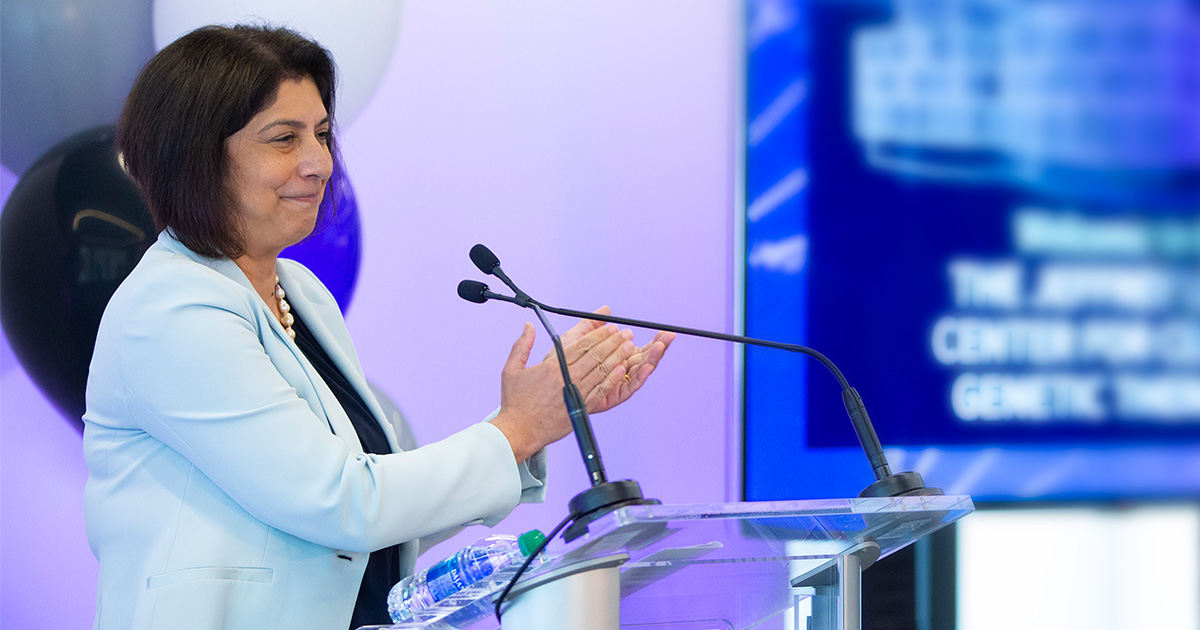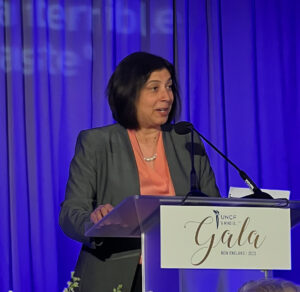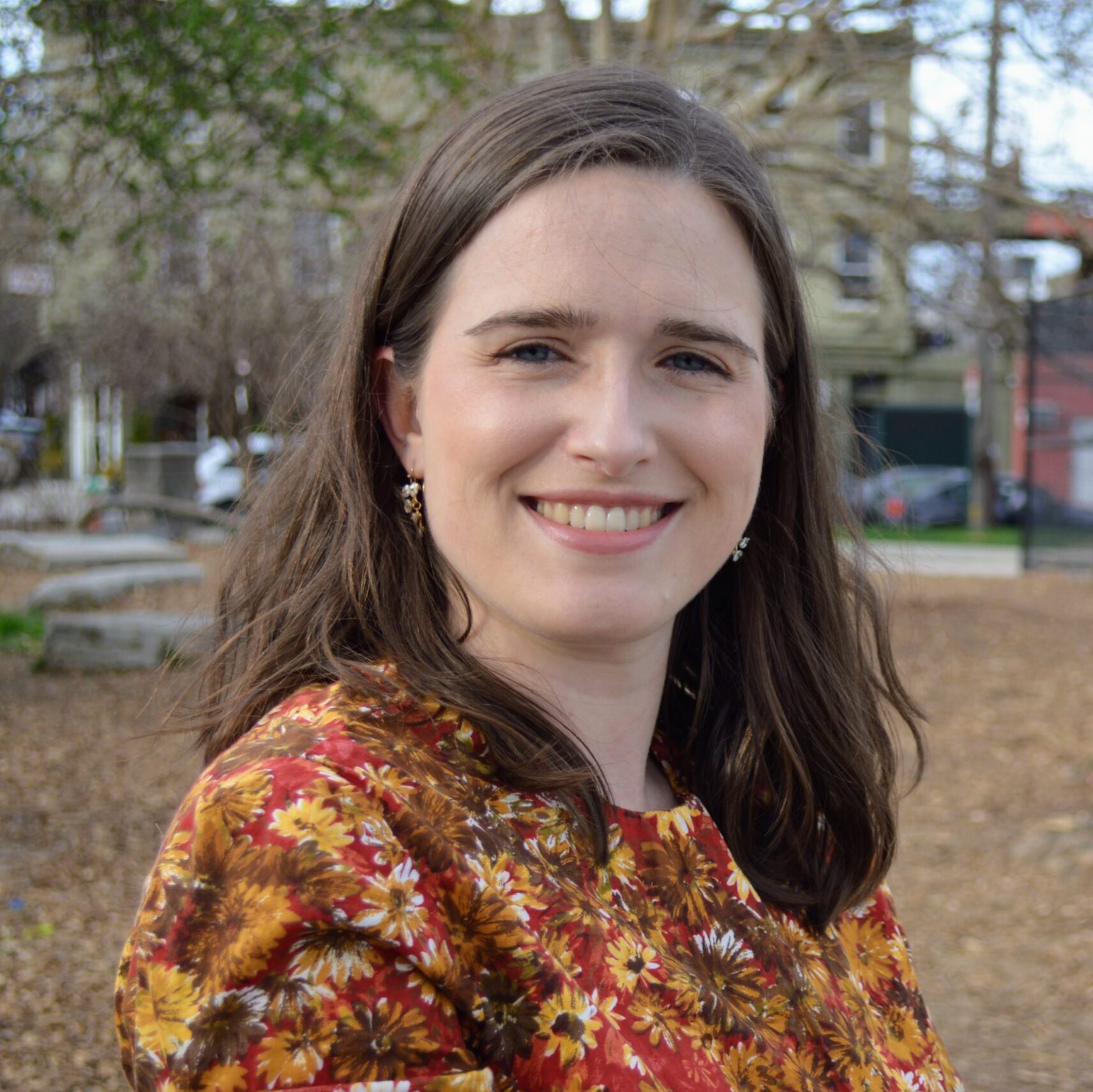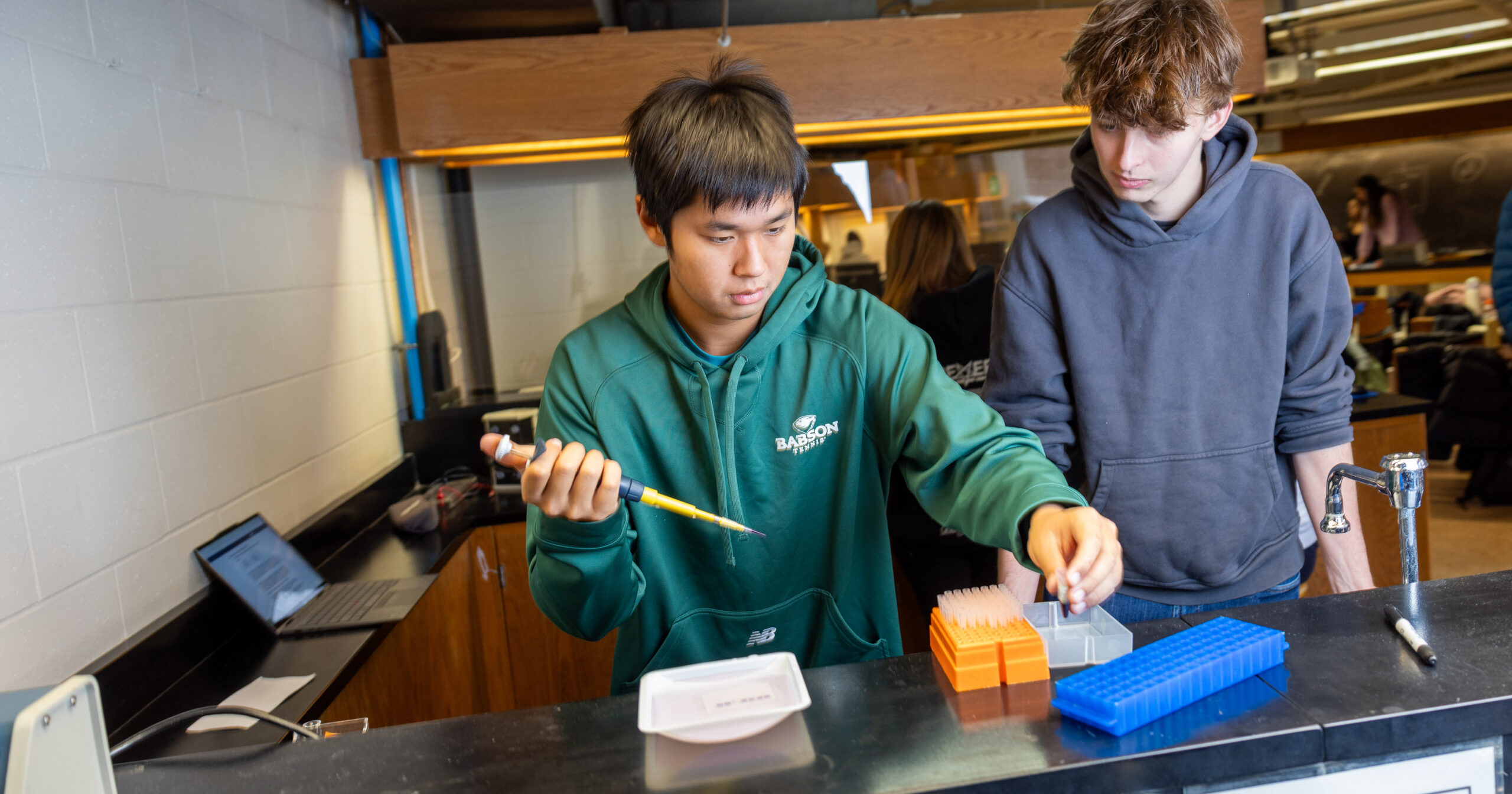Reshma Kewalramani on Taking Risks and the Relentless Pursuit of Innovation

Reshma Kewalramani already was a nephrologist and researcher in academia when she received the unexpected phone call that changed the course of her career. A biotech executive—the son of her department chair—sought her out for a role at Amgen, the biotechnology company.
That call set her on a course that, decades later, would lead to a career steeped in innovation and advancement, and on the cutting edge of medical research. It also would lead her to Babson College, where she will address the Class of 2023 graduate Commencement ceremony on May 13 and receive an Honorary Doctor of Humane Letters degree.
But, in 2004, the future that Amgen might offer her remained wholly unknown. Kewalramani had always intended to become a doctor. After graduating from medical school, she set out to become what was called a triple threat: She would see patients, teach, and run her own lab. But, her academic lab prioritized fundamental discoveries, regardless of whether they led to new medicines, and she felt isolated from the patients she was driven to help. What she wanted was to work on new medicines, something she couldn’t do within her role.

Reshma Kewalramani, CEO and president at Vertex Pharmaceuticals, the first female CEO of a large biotech company.
“I realized if I wanted to do that—drug discovery, clinical trials, make new medicines—that actually happens in industry, whether it’s biotech or pharma,” Kewalramani said, “that’s really the heart of where that action is.”
That left her with a choice. She could remain in Boston, surrounded by friends and family, continuing to practice medicine—the career she had always envisioned—or she could take a risk. And, as Kewalramani knew, risk was often proportional to reward.
So, she and her husband quit their jobs. They packed up their 6-month-old twins, left Kewalramani’s beloved Boston behind, and moved to California, where they remained for the next 13 years. During that time, Kewalramani rose through various roles before becoming Amgen’s vice president and head of the U.S. medical organization in 2014.
Kewalramani returned to Boston in 2017, taking a leadership role at Vertex Pharmaceuticals, before rising to the position of CEO and president in 2020. And, as the first female CEO of a large biotech company, Kewalramani exemplifies the need for entrepreneurial leaders who place their values at the forefront. She has overseen significant advances in treatments for cystic fibrosis, sickle cell disease, beta thalassemia, APOL1-mediated kidney disease, pain, type 1 diabetes, and more.
Work within health care is complex, fraught with risk, and essential for any healthy, thriving community. By comparison, Kewalramani said, leadership and decision making at Vertex is actually quite simple: The “goal is very clear. It is to make medicines that transform, if not cure, diseases. And, so when it comes down to setting priorities, allocating resources, making decisions, that is the north star.”
The Relentless Pursuit of Innovation
With a market cap of roughly $75 billion, Vertex has grown into an undeniable leader within Boston’s thriving biotech industry. Vertex is a “disease-first company,” an organization structured around the drive to treat specific diseases, rather than a given technology, and under Kewalramani’s leadership they are committed to producing innovative scientific discoveries that provide a clear and direct benefit to patients in need.

Under Kewalramani’s leadership, Vertex Pharmaceuticals has grown into an undeniable leader within Boston’s thriving biotech industry.
“People are surprised because it’s almost as if we’ve come out of the dark and emerged front and center,” Kewalramani said, “but like most things, it wasn’t an overnight success.”
Kewalramani builds upon more than 30 years of prudent decision making, taking Vertex from its origins as a small molecule company, focused on producing medications typically taken by mouth each day, toward regenerative medicines, treatments designed to transform or cure diseases.
But, success is not a linear path, and complacency can damage even the most competitive product. To prove it, Kewalramani points to Vertex’s recent history. In 2011, Vertex launched Incivek, the fastest molecule of its time to rise from zero to $1 billion in revenue. Incivek also became the fastest molecule of its time to fall from $1 billion back down to zero.
“We don’t do incremental improvement, we innovate to transform or cure, and we serially innovate. We simply are relentless in that way, and our own history has taught us to be like that.”
Today, Kewalramani is on the cusp of bringing Vertex’s work with CRISPR/Cas9 to patients. Vertex also is pursuing the benefits of mRNA technology for patients with cystic fibrosis. And, through its work in cell therapy, Kewalramani said, Vertex has treated two patients with type 1 diabetes—one has become insulin free and the other has received tremendous benefit. “It’s quite amazing, because just 30 years ago, we were a small molecule company.”
Opportunities Await
The pandemic years again have proven that health care impacts everyone. “So, whether or not we are interested in health care as careers,” Kewalramani said, “it’s really important to understand the science behind the medicine and work collectively, especially as Babson students, to make sure that health care is front and center, that we continue to innovate to make new medicines, and that these medicines are accessible to patients.”
“We don’t do incremental improvement, we innovate to transform or cure, and we serially innovate. We simply are relentless in that way, and our own history has taught us to be like that.”
Reshma Kewalramani, CEO and president of Vertex Pharmaceuticals
Kewalramani also believes that we are on the brink of a movement from chronic therapies, requiring medicines taken daily by mouth over lifetimes, to curative therapies, one-and-done treatments with the goal to radically transform, if not cure, diseases. With this change comes enormous opportunities for those who are prepared to lead with their values, think entrepreneurially, and take risks.
It’s a path that Kewalramani has carved into an impactful, successful career, and it’s advice she is eager to share with Babson graduates when she addresses them at Commencement. “Do things that make you uncomfortable,” she said. “Know that you’re going to have a team of people around you, and that it’s actually more important to know how to ask all the right questions than it is to have all the right answers.”
Posted in Community




